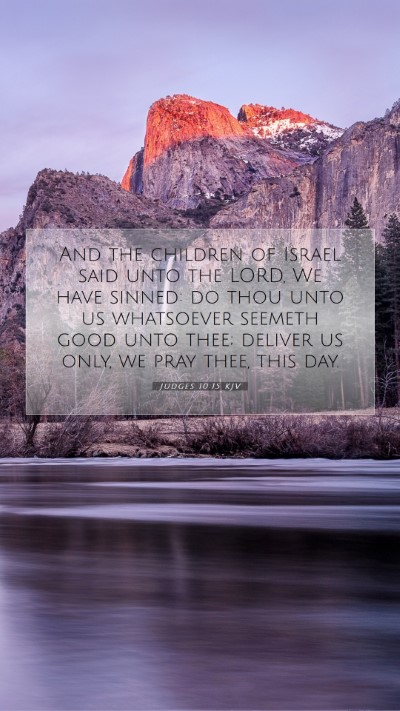Old Testament
Genesis Exodus Leviticus Numbers Deuteronomy Joshua Judges Ruth 1 Samuel 2 Samuel 1 Kings 2 Kings 1 Chronicles 2 Chronicles Ezra Nehemiah Esther Job Psalms Proverbs Ecclesiastes Song of Solomon Isaiah Jeremiah Lamentations Ezekiel Daniel Hosea Joel Amos Obadiah Jonah Micah Nahum Habakkuk Zephaniah Haggai Zechariah MalachiJudges 10:15 Meaning
What is the meaning of Judges 10:15?
And the children of Israel said unto the LORD, We have sinned: do thou unto us whatsoever seemeth good unto thee; deliver us only, we pray thee, this day.
Judges 10:15 Bible Verse Meaning
Bible Verse Commentary: Judges 10:15
Verse: Judges 10:15 - "And the children of Israel said unto the LORD, We have sinned: do thou unto us whatsoever seemeth good unto thee; deliver us only, we pray thee, this day."
Understanding the Context
The Book of Judges narrates a turbulent period in Israel's history when the people repeatedly turn away from God, leading to oppression and distress. In Judges 10, Israel finds itself again in captivity, realizing their sin and crying out to God for deliverance. The profound statement in this verse encapsulates Israel's recognition of their wrongdoing and their humble plea for mercy.
Bible Verse Meanings from Commentaries
-
Matthew Henry:
Henry emphasizes the sincerity of Israel's repentance. They acknowledge their sins and surrender to God's will, exhibiting a crucial element of true repentance—submission. Their plea, "do thou unto us whatsoever seemeth good unto thee," reflects a willingness to accept God's judgment while desperately seeking His deliverance.
-
Albert Barnes:
Barnes comments on the historical context, indicating that Israel's cry emerges after numerous cycles of sin and oppression. The phrase highlights their acknowledgment of divine sovereignty and the necessity of God's intervention for their salvation, a theme recurrent in the narrative of the Judges.
-
Adam Clarke:
Clarke illustrates the verse's emotional weight, interpreting the Israelites' words as a heartfelt plea for grace amidst their guilt. He pointed out that their acceptance of whatever God deems right signifies a mature understanding of their relationship with Him, moving beyond mere requests for help to a deeper theological reflection on God's governance.
Deep Dive into Biblical Exegesis
In examining this verse, we can uncover layers of meaning that offer profound insights into the nature of repentance, divine mercy, and human frailty. The penitent heart recognizes its failures and places itself in the hands of an omnipotent God, asking only for deliverance.
Thematic Elements:
- Repentance: The act of acknowledging sin is fundamental in the relationship between Israel and God. This illustrates the necessary step toward restoration.
- Divine Authority: The recognition of God’s sovereignty is key. The verse underscores that true restoration requires submission to God's will.
- Hope in Despair: Despite their dire circumstances, the people of Israel exhibit hope through their prayers, emphasizing faith in God's power to save.
Applying the Lessons from Judges 10:15
For contemporary readers, the implications of this verse resonate with themes of repentance and divine grace. It encourages self-examination and humility, recognizing our failures and the need for divine intervention. In understanding this scripture, we can find pathways to apply its teachings in daily life.
Practical Applications:
- Engage in personal reflection to acknowledge areas of sin or negligence in life.
- Embrace a posture of humility when approaching God in prayer, seeking His will over personal desires.
- Find solace in the assurance that God is merciful and ready to respond to genuine pleas for help.
Cross References
- Psalm 51:1-4 - A prayer of repentance and acknowledgment of sin.
- Isaiah 55:7 - An invitation for the wicked to forsake their ways and return to God.
- Jeremiah 3:12-13 - An appeal to Israel to return to God with acknowledgment of sins.
Conclusion
Judges 10:15 serves as a poignant reflection of the human condition and our relationship with God. With insights derived from respected public domain commentaries, we gain a richer understanding of this scripture. The heart of the matter lies in recognizing our failings, seeking God earnestly, and submitting to His divine will. For those interested in further Scripture analysis, exploring this verse alongside its context offers valuable Bible study insights.


